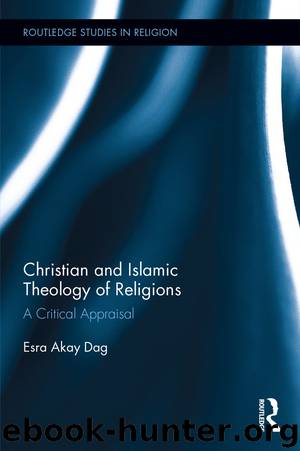Christian and Islamic Theology of Religions by Akay Dag Esra;

Author:Akay Dag, Esra;
Language: eng
Format: epub
Publisher: Routledge
Published: 2017-03-31T16:00:00+00:00
3.2 Yasir Qadhi’s and Tim Winter’s theological exclusivism
Although the traditional form of exclusivism is the oldest Islamic position towards non-Muslims, recently some scholars have revised traditional exclusivism more sophistically in the contemporary period. Yasir Qadhi, an America-based Muslim theologian, is among these theological exclusivists. Having examined discussions of the salvation of non-Muslims from the classical and mediaeval period, Qadhi has come to the conclusion that the shared belief of mediaeval Muslim scholars is that Islam is the only path to God; thus other religions, including Christianity and Judaism, are not acceptable in the eyes of God.77 In other words, he reiterates the theory of supersessionism. He believes that the main reasons for the rejection of the salvific means of non-Islamic traditions are given in numerous Qur’anic verses. He classifies these verses into three categories.
The first group of verses78 indicates that Islam is the only religion acceptable to God. According to Qadhi, the term ‘Islam’ cannot be reduced to such an abstract meaning as submission alone. He contends that the context is clear and apparent that Islam is used to refer to the religion of Islam and that surrounding verses criticise aspects of the Christian and Jewish faiths. The second group of verses indicates that rejection of the message of the Prophet and his Prophethood is tantamount to a rejection of God. He uses verses 2:285, 38:14, 34:45, 68:9, 57:7, 7:156–158, 4:115, 4:65 and 48:13 as examples and argues that ‘true belief in God goes hand in hand with belief in His Prophet and His final revelation.’79 The final group of verses criticise the beliefs of other faiths. Qadhi states that although the Qur’an acknowledges the authenticity of the Torah, Psalms and Gospel, it presents Christians and Jews as having concealed and deviated from the true teaching of their prophets.80 As for Christians, he uses verses 9:30–31 as an example of Christians’ commitment to unbelief. Qadi argues that these three groups of verses provide the context for interpreting any Qur’anic verses which seem to accept a more pluralistic vision.81
Apart from the Qur’anic account, the hadiths of Prophet Muhammad also show that the pluralist interpretation is not acceptable in Islam. In addition, there is a consensus (ijma) among Muslim scholars on the issue that more than one religion cannot be simultaneously valid; it is illogical as each religion has its own tenets.82 As a result, using all the Islamic sources, Qadhi believes that the only path that leads to God is Islam. However, this neither means that all Muslims will go to heaven nor that all non-Muslims will be damned. For Muslims, the requirement to earn God’s mercy is both orthodoxy and orthopraxy.83 Regarding non-Muslims, God’s punishment will be for those who understand the message of God and willingly reject it. Rather than judging who is going to be saved, it is better to leave it to God since God knows and therefore is the best judge.
Like Qadhi, Tim Winter, a British convert to Islam, relies on traditional theological kalam, mainly Al-Ghazali’s thought, to construct his own approach.
Download
This site does not store any files on its server. We only index and link to content provided by other sites. Please contact the content providers to delete copyright contents if any and email us, we'll remove relevant links or contents immediately.
| Hadith | History |
| Law | Mecca |
| Muhammed | Quran |
| Rituals & Practice | Shi'ism |
| Sufism | Sunnism |
| Theology | Women in Islam |
The History of Jihad: From Muhammad to ISIS by Spencer Robert(2620)
Nine Parts of Desire by Geraldine Brooks(2361)
The Turkish Psychedelic Explosion by Daniel Spicer(2354)
The First Muslim The Story of Muhammad by Lesley Hazleton(2268)
The Essential Rumi by Coleman Barks(2043)
1453 by Roger Crowley(2023)
The Last Mughal by William Dalrymple(1855)
Trickster Travels: A Sixteenth-Century Muslim Between Worlds by Davis Natalie Zemon(1847)
Muhammad: His Life Based on the Earliest Sources by Martin Lings(1644)
God by Aslan Reza(1639)
by Christianity & Islam(1627)
A Concise History of Sunnis and Shi'is by John McHugo(1567)
No God But God by Reza Aslan(1540)
Magic and Divination in Early Islam by Emilie Savage-Smith;(1533)
The Flight of the Intellectuals by Berman Paul(1501)
Nothing to Envy by Barbara Demick(1445)
Art of Betrayal by Gordon Corera(1429)
What the Qur'an Meant by Garry Wills(1391)
Getting Jesus Right: How Muslims Get Jesus and Islam Wrong by James A Beverley & Craig A Evans(1340)
